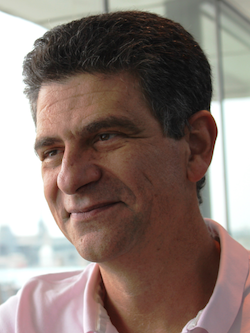Georgi Gaydadjiev has started in Groningen as professor in Innovative Computer Architectures

At CogniGron, we are delighted to welcome Georgi Gaydadjiev, who will join our team as Professor of Computing in Innovative Computer Architectures.
Georgi Gaydadjiev is a Computer Engineer with industrial and academic experience for more than 30 years. Before starting his academic career at the university of Delft, the Netherlands, Georgi worked on various designs of embedded systems (even before such systems were awarded this name) at Pijnenburg Microelectronics and Software in Vught, the Netherlands. In 2002, Georgi joined the Computer Engineering (CE) laboratory at the Electrical Engineering, Mathematics and Computer Science (EEMCS), TU Delft as a faculty member. At CE his research focused mainly on Computer Architecture and Microarchitecture for reconfigurable, highly customized and safety critical computing systems. Subsequently he received a personal grant by the Swedish Research Council (VR) and joined Chalmers University of Technology as a chair professor in Computer Systems Engineering. Not long after, in the fall of 2014 Georgi joined Maxeler Technologies Ltd in London for what was supposed to be just one-year sabbatical. In reality this became a five years involvement that also led to the creation of Maxeler IoT-Labs BV in Delft in December 2017. At Maxeler in London Georgi led the Dataflow Software Engineering division as one of the company’s vice presidents and focused on the research and development of highly customized High-Performance Computing (HPC) systems. Some of the above systems were able to outperform TOP-500 supercomputers in very specific tasks while using only a fraction of the required electrical energy. In Delft, Georgi and his team work on the deployment of the streaming dataflow technology by Maxeler outside of the datacenter in order to enable HPC capabilities close to the data sources and as such improve end-to-end system performance and reduce energy usage.
In August 2019 Georgi joined the University of Groningen as a professor in Innovative Computer Architectures. His focus will be on research of advanced (digital and non-digital) highly customized computing systems able to satisfy the needs of our modern society, and more particularly those of the scientific and engineering communities.
Curriculum Vitae
In the 80-ies he first studied at Voenmeh (currently named Baltic State Technical University) in Leningrad, Soviet Union and thereafter worked at the booming computer industry in Bulgaria designing personal computers I/O peripherals at System Engineering Ltd in Pravetz. Afterwards he joined Pijnenburg Microelectronics and Software in Vught, the Netherlands and worked on various designs of embedded systems. One of the products developed by his team won the Design and Engineering showcase award at the Consumer Electronics Show (CES) in Las Vegas in 1999. While working at Pijnenburg M&S, he also enrolled at TU Delft and successfully completed a master of science in Electrical Engineering study.
In 2002, Georgi joined the Computer Engineering (CE) laboratory at the Electrical Engineering, Mathematics and Computer Science (EEMCS), TU Delft as a faculty member. His research was funded by STW, the European Commission, point.one, CenterNovem/BSIK and Google Inc in USA. Almost one decade after starting at TU Delft, in 2011, he received a personal grant by the Swedish Research Council (VR) and joined Chalmers University of Technology as a chair professor in Computer Systems Engineering. In 2014 Georgi joined Maxeler Technologies Ltd that led to the creation of Maxeler IoT-Labs BV in Delft in December 2017. At Maxeler in London Georgi led the Dataflow Software Engineering division as one of the company’s vice presidents.
| Last modified: | 13 January 2020 11.30 a.m. |
More news
-
16 April 2024
UG signs Barcelona Declaration on Open Research Information
In a significant stride toward advancing responsible research assessment and open science, the University of Groningen has officially signed the Barcelona Declaration on Open Research Information.
-
02 April 2024
Flying on wood dust
Every two weeks, UG Makers puts the spotlight on a researcher who has created something tangible, ranging from homemade measuring equipment for academic research to small or larger products that can change our daily lives. That is how UG...
-
18 March 2024
VentureLab North helps researchers to develop succesful startups
It has happened to many researchers. While working, you suddenly ask yourself: would this not be incredibly useful for people outside of my own research discipline? There are many ways to share the results of your research. For example, think of a...
